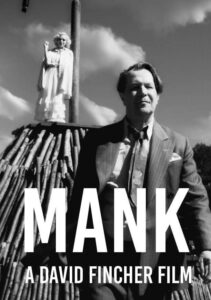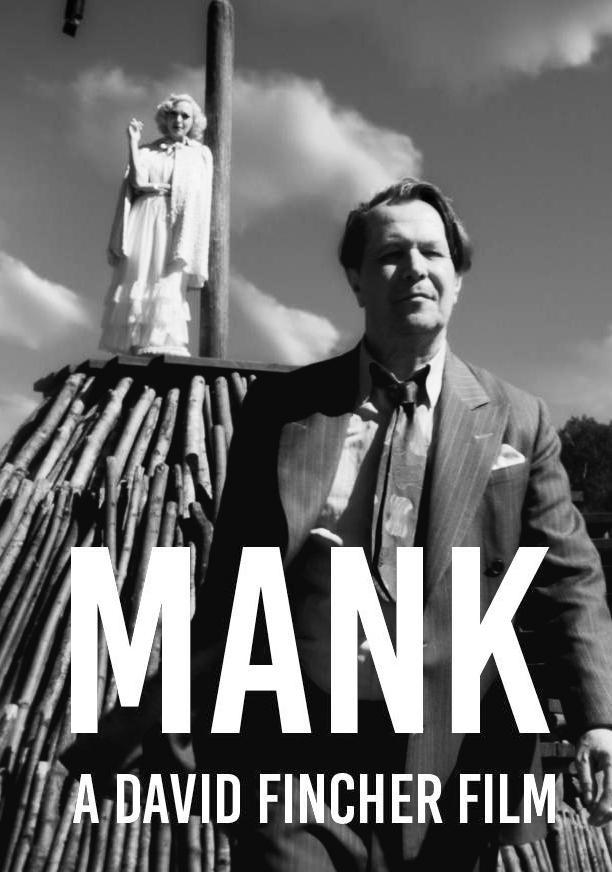Mank
Posted on December 2, 2020 at 12:00 pm
A-| Lowest Recommended Age: | High School |
| MPAA Rating: | Rated R for some language |
| Profanity: | Very strong language |
| Alcohol/ Drugs: | Alcohol abuse and alcoholism |
| Violence/ Scariness: | None |
| Diversity Issues: | None |
| Date Released to Theaters: | December 4, 2020 |

“Mank” is firmly rooted in its period, down to the black and white film with high ceilings and shadowy images, paying tribute to “Citizen Kane” and other films of that era, it is, like most films set in a different time, very much in conversation with and commentary on where we are today. So. the settings are re-created with exquisite precision and any old Hollywood cinephiles will be overjoyed to be able to visit the office of legendary producer Irving Thalberg (Ferdinand Kingsley) or sit in on a writers’ conference featuring the men who wrote films like Charles Lederer (the original “Oceans 11,” “His Girl Friday,” “Gentlemen Prefer Blondes,” played by Joseph Cross) and Ben Hecht (“Scarface,” “Gunga Din,” played by Jeff Harms. They will also get a kick out of the faux “cue marks,” the circles in the upper right-hand corners of the frame to let the theater projectionist know when it was time to get ready to change reels, long disappeared from movies in the digital era.
And then there is San Simeon, the unimaginably lavish Hearst castle built by the unimaginably wealthy William Randolph Hearst (Charles Dance). He was the heir to a gold mining fortune and a political dynasty. He became the owner of the country’s largest media empire, which he used to push his political priorities. Is the commentary on today coming into focus?
Herman Mankiewicz was brilliant, sardonic, cynical, and a raging alcoholic and gambler. He ruefully notes that his wife is always referred to as ‘poor Sarah” (“Downton Abbey’s” Tuppence Middleton). He was a real-life version of those journalists in the wild wild West days of newspapers, as often portrayed by Clark Gable. He famously sent a telegram to Ben Hecht (in the movie version to Charles Lederer encouraging him to come to Hollywood: “Millions are to be grabbed out here and your only competition is idiots. Don’t let this get around.”
A brilliant trouble-maker of an enfant terrible from radio and theater named Orson Welles (Tom Burke) has been given free rein to make a movie, what he would later call “the The biggest electric train set any boy ever had.” He asks Mankiewicz, recovering from a leg injury, to write the script and puts him in a remote cabin with a secretary (Lily Collins as Rita Alexander) to keep him away from “distractions,” meaning booze and gambling.
Like “Citizen Kane,” the movie goes back and forth in time, the flashbacks illuminating the movie’s present, especially the inspiration for the title character, who would be played by the 25-year-old director himself. We see moments and characters and ideas sparking the ideas in the screenplay. And we see the painful and often self-destructive force of an intellect that is so deeply cynical only because at heart he is so deeply idealistic.
Mank’s warm friendship with Marion Davies (Amanda Seyfried) is at the heart of the movie. He can be honest with her because she is honest with him and because, unlike “poor Sarah,” he does not feel, at least in the earlier days of their relationship, that he is letting her down. Davies was the long-time romantic partner of Hearst, who was married to someone else. He ordered his newspapers to write about her frequently, leading to the joke that every story about a Hollywood event had the line “And Marion Davies looked lovely.” (Because of the Susan Alexander character in “Citizen Kane,” the second wife Kane insisted on promoting as an opera singer with disastrous results, people often think Davies was untalented, but she was a lovely light comedienne with a charming presence on screen.)
Because of Davies, Mankiewicz is often a guest at San Simeon and has a cordial relationship with Hearst, until Hearst’s opposition to the progressive California gubernatorial candidate Upton Sinclair (cannily played by Science Guy Bill Nye) and the movie studios’ anti-Sinclair propaganda “news” films lead to intolerable behavior in social gatherings — and to the corrupt, lonely former idealist Charles Foster Kane.
It is pure pleasure to see a film that respects the audience enough to take on big issues with complexity, humanity, and wit, every careful detail and layered performance providing much to think about and many questions about our own time and how it will be seen eighty years from now, if we are lucky enough to have filmmakers of this quality.
Parents should know that this movie includes strong language, alcoholism and other addictive behavior, some sexual references, and references to the Holocaust.
Family discussion: Who is most like William Randolph Hearst today? Most like Upton Sinclair? Why did Mank change his mind about wanting credit for the movie? Was he fair to Marion Davies?
If you like this, try: “Citizen Kane” and the book about the film by Pauline Kael, Mank: The wit, world, and life of Herman Mankiewicz, and other films by and about the Mankiewicz brothers and Welles. And see some of Marion Davies’ films like “Peg o’ My Heart” and “Show People.”

